Uncovering the Truth About Beef and Deforestation
Air Date: Week of May 24, 2024
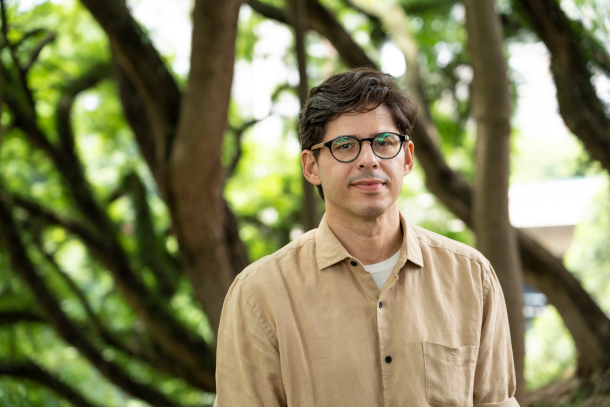
Marcel Gomes is the executive secretary at the nonprofit media outlet Repórter Brasil and leads the organization’s investigations and research teams. He is the 2024 winner of the Goldman Environmental Prize for Central and South America. (Photo: Goldman Environmental Prize)
The Brazilian cattle industry has led to massive land clearing in the Amazon rainforest. Investigative journalist Marcel Gomes set out to uncover which companies were involved and documented a direct link between the meatpacking company JBS and illegal deforestation in Brazil. He received the 2024 Goldman Environmental Prize for Central and South America and joins Host Paloma Beltran to talk about the need for more transparency about where beef comes from and better cattle grazing practices.
Transcript
BELTRAN: The Brazilian cattle industry is responsible for around 20% of the world’s beef exports. But cattle need lots of land to graze, and to make space, ranchers set massive fires to clear the forests. Marcel Gomes is the executive secretary of the nonprofit media outlet Repórter Brasil and the 2024 Goldman Environmental Prize winner for Central and South America. Gomes and his team conducted research to prove a direct link between the meatpacking company JBS and illegal deforestation in Brazil. The native ecosystems under threat include not only the Amazon rainforest but also the savanna known as the Cerrado and the tropical wetland called the Pantanal. I asked Marcel what makes these ecosystems so important.
GOMES: First of all, they are a very important source of water resources for Brazil and for other countries. The main rivers from Brazil are crossing the area, or the origin of these river are those areas. So it's very important for water supplying the big cities in Brazil. The second issue is a climate issue. We know that Amazon is a big tropical forest that regulates the climate not only in Brazil, but the entire planet. So it's very important to preserve the forest. I'm journalist. So I think it's very important for journalism to speak about these issues related to not only the forest itself, the importance of preserve that area of Brazil, but also to know that there are a lot of communities, traditional communities, indigenous populations, quilombolas, which are the descendants of the former slave people, to talk about the impacts that has been affecting these communities in the Amazon and the other biomass.
BELTRAN: And how have indigenous populations in the Amazon rainforest been impacted by the cattle industry?
GOMES: Yeah, so the Brazilian herd is expanding to the Amazon, and now more than 40% of the Brazilian herd is in Amazon. Of course, this is causing deforestation. And we know that indigenous people depend on the forest to live. It's from the forest they get resources, they get food, water. Without forest, we don't have indigenous communities, and you don't have this traditional population living in that area.
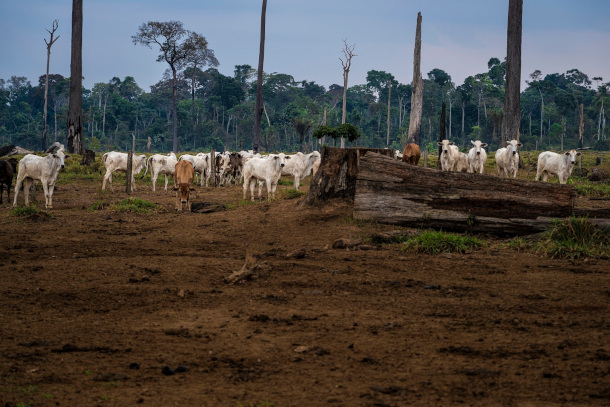
Deforestation from the cattle industry in Brazil threatens major ecosystems including the Amazon rainforest, the biodiverse savanna known as the Cerrado, and the tropical wetland called the Pantanal. (Photo: Fernando Martinho)
BELTRAN: You've done incredible work proving the direct link between the meatpacking company JBS and illegal deforestation in Brazil. What makes this work so important?
GOMES: Cattle industry is a powerful sector, economic sector in Brazil. Brazil it's a major exporter of beef. The cattle industry is also a source of biofuels. For example, biodiesel in Brazil, 20% of the Brazilian biodiesel is made by animal fat. Also, the leather is used by the car industry to build the seats of cars, and also by the garment industry. So it's a very powerful and interconnected industry. But at the same time, it's source of illegal deforestation, modern slavery, contamination of water resource, so a lot of problems. So it's important to investigate the industry in order to provide more transparency about the supply chains, and start dialogues with companies and authorities about the impacts they have been causing, and discuss how to address these issues and improve the mode of production.
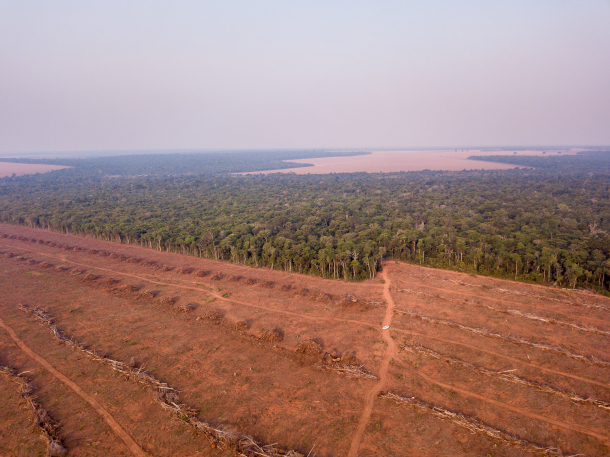
The Amazon rainforest is crucial to regulating the climate not only in Brazil, but across the planet. (Photo: Fernando Martinho)
BELTRAN: And as part of your research, you tracked the deforestation in the Amazon rainforest. You tracked which land was cleared for cattle, and for what company. How did that happen, and what makes this work so difficult?
GOMES: Yeah, first of all, there is no transparency in the industry. If you contact any company and request information about the suppliers, you don't receive this kind of information. Because of this, investigative journalism it's a source of that kind of information. So we worked for almost one year in partnership with international organizations. In Brazil, we investigate the first part of the supply chain, particularly the connections between the ranch and the slaughterhouse. So we used data, public data, to provide these connections, and also in order to identify the destination of the Brazilian beef, we hired researchers in different countries, in different cities in Europe, in the U.S., even in Brazilian cities, and the researchers, they went to supermarket stores in order to take pictures of the Brazilian meat. And through those pictures, we are able to identify the slaughterhouse which are supplying the beef to the supermarkets. Then we have 100% of the supply chain traced—the whole supply chains, from the ranch to the supermarket. So it was a lot of work. We explored the supply chain of the three major slaughterhouse we have in Brazil, JBS, Marfrig, and Minerva. And we published a very important report that caused a big impact against the industry.
BELTRAN: And as a result of your team's investigations, six major European market chains committed to stop selling JBS beef products. And some of them actually promised to stop selling all beef products from Brazil. Why focus on the European market?
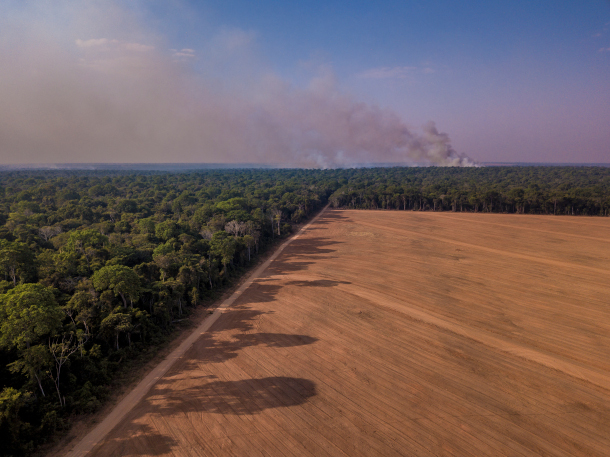
An aerial image of an agricultural field and illegal forest burning in Brazil. (Photo: Fernando Martinho)
GOMES: Some European countries, they have due diligence legislation. So that's very powerful, because companies are not only taking care of the supply chain because the consumers like it, but it's mandatory according to the legislation. So when we offer evidences that there are problems in the origin of the beef, then you can discuss next steps related to litigation, for example, based on the due diligence legislation the country has. So it's really powerful when we focus on countries like France, where they have these kind of legal frameworks.
BELTRAN: How did JBS react to your investigation and all of these boycotts?
GOMES: JBS has a strong department of PR, of course, they have been publishing what they have been doing in terms of reaction, how they have been improving, according to, to them, the monitoring and the control of supply chains. Some years ago, they launched a new framework for the sustainability policies. What's good, we are happy that they have been trying to get some improvements. But our main point is that not only JBS but the other major slaughterhouse, they don't have monitoring 100% of the supply chains. The cattle doesn't stay the whole life in the same area. The farms, the ranches, they are specialized in parts of the cattle life. So the cattle, besides reach the slaughterhouse, they can pass three, four, five farms. And we know in Brazil that the problem nowadays is more concentrate in the indirect suppliers. So our main request for the industry is that is important to monitor the whole supply chain, not only of the last farm, which is what they have been doing so far.
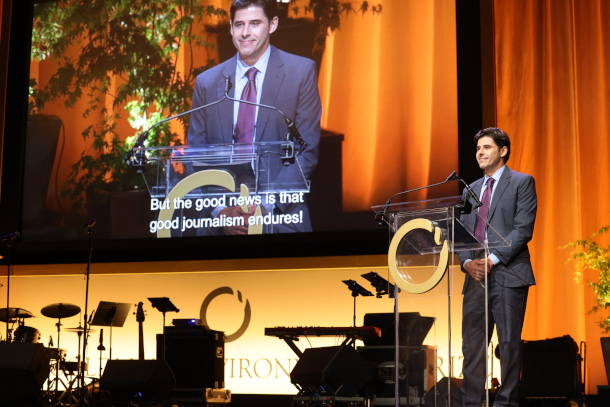
Marcel Gomes accepted his award at the 2024 Goldman Prize ceremony in San Francisco. An investigative report by Gomes’s team at Repórter Brasil led six major European supermarket chains to stop selling products from the meatpacking company JBS, which the report directly linked to deforestation in Brazil. (Photo: Goldman Environmental Prize)
BELTRAN: What other changes would you like to see to address deforestation in Brazil?
GOMES: The government is particularly interested in reducing the deforestation in Amazon, and deforestation rates in Amazon are going down. Unfortunately, the deforestation rates are still going up in Cerrado. In most of Cerrado, according to legislation, you can deforest about 80% of the farm. It's legal. So we need that the government address the deforestation, even the legal deforestation in Cerrado. Because it is possible, according to the specialists we have in the country, to expand the production of food in Brazil, the production of soy, the production of cattle, without deforesting any new hectare in the country. So that's our point: we need in the next couple of months to reduce deforestation in Cerrado, doesn't matter if it's legal or illegal.
BELTRAN: Marcel Gomes is the 2024 Goldman Environmental Prize recipient for South and Central America. Thank you for joining us.
GOMES: Thank you very much, Paloma.
Links
Watch Marcel Gomes’s profile video from the Goldman Environmental Prize
Learn more about Marcel Gomes on the Goldman Prize website
Retailers’ responses to the 2021 Repórter Brasil investigation
Reuters| “European Supermarkets Stop Selling Brazil Beef Over Deforestation Links”
Living on Earth wants to hear from you!
Living on Earth
62 Calef Highway, Suite 212
Lee, NH 03861
Telephone: 617-287-4121
E-mail: comments@loe.org
Newsletter [Click here]
Donate to Living on Earth!
Living on Earth is an independent media program and relies entirely on contributions from listeners and institutions supporting public service. Please donate now to preserve an independent environmental voice.
NewsletterLiving on Earth offers a weekly delivery of the show's rundown to your mailbox. Sign up for our newsletter today!
 Sailors For The Sea: Be the change you want to sea.
Sailors For The Sea: Be the change you want to sea.
 The Grantham Foundation for the Protection of the Environment: Committed to protecting and improving the health of the global environment.
The Grantham Foundation for the Protection of the Environment: Committed to protecting and improving the health of the global environment.
 Contribute to Living on Earth and receive, as our gift to you, an archival print of one of Mark Seth Lender's extraordinary wildlife photographs. Follow the link to see Mark's current collection of photographs.
Contribute to Living on Earth and receive, as our gift to you, an archival print of one of Mark Seth Lender's extraordinary wildlife photographs. Follow the link to see Mark's current collection of photographs.
 Buy a signed copy of Mark Seth Lender's book Smeagull the Seagull & support Living on Earth
Buy a signed copy of Mark Seth Lender's book Smeagull the Seagull & support Living on Earth

